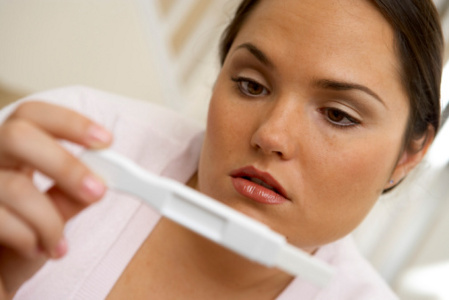Am I Pregnant?: Myths and Facts About Sex
0 Comments
“Am I Pregnant?”
Many women ask themselves this question throughout their lives. Understanding what causes pregnancy and debunking the myths may help you find the answer. Photo: Getty Images

What Causes Pregnancy?
Pregnancy occurs when sperm gets into the vagina or on the vulva. The vulva is the external female genitalia that includes the folds of skin, or labia, and clitoris. Photo: Getty Images

Can Pre-ejaculate Cause Pregnancy?
Pre-ejaculate, also called pre-cum, is the liquid that leaks out of the penis during sexual arousal but before ejaculation. Pre-ejaculate is not semen and does not contain sperm. But, it can pick up sperm remaining in his urethra from a previous ejaculation. Generally, sperm can live up to 7 days in the reproductive tract. Sperm is highly sensitive to temperature and moisture, and will eventually die outside the body. However, on average, each ejaculation contains about 300 million sperm. Photo: Getty Images

Can I Get Pregnant if His Penis Doesn’t Enter My Vagina?
Unprotected vaginal intercourse is the most likely way to get pregnant. You can get pregnant if you engage in body rubbing with your clothes off. Sperm can come in contact with the vulva or vagina. Any type of sex play where semen comes in contact with the vulva can possibly lead to pregnancy. Although the chances are low, sperm can travel through the moisture on the vulva and into the vagina. Photo: Getty Images

When Am I Most Likely to Get Pregnant?
You have a greater chance of getting pregnant from unprotected vaginal intercourse during the 6 days of your menstrual cycle before ovulation. Ovulation occurs when an egg is released from an ovary. However, ovulation is not easy to predict. Theoretically, this happens 14 days before the start of a period. But for many women, the length of a menstrual cycle varies month by month. Though you are less likely to get pregnant from unprotected vaginal intercourse a day or two after ovulation, it is still possible. Photo: Getty Images

I Missed My Period! Am I Pregnant?
There is a good chance that you are pregnant if you missed your period and had unprotected sex. However, irregular periods and skipped periods can occur because of hormonal imbalances, stress, stringent dieting with prolonged and severe weight loss, and excessive exercise like rigorous athletic training. Photo: Getty Images

Should I Take a Home Pregnancy Test?
Many home pregnancy tests claim to be accurate as early as the first day after a missed period, and even before. One product claims to detect the pregnancy hormone hCG 6 days before your missed period. For the most reliable results, wait one week after a missed period until testing. Before testing, read the directions and follow them carefully. You can get a false-positive if you were recently pregnant or take a pregnancy test too soon after taking fertility drugs that contain hCG. Ovarian cysts, ectopic pregnancy and menopause may give misleading results. You can get a false-negative if take the test too early, time the test wrong, or use diluted urine. For the most accurate results, test the first urine of the morning, which is concentrated because it has been in your bladder overnight. Photo: Getty Images

Should I Take Emergency Contraceptive?
Emergency contraceptive, known as the morning after pill, is available without prescription for women and men ages 17 and older. It contains high doses of levonorgestrel, which is the hormone found in many birth control pills. It should be taken as directed up to 3 days or 72 hours after unprotected sex or contraceptive failure. Examples of contraceptive failure include your partner’s condom slipping or braking and forgetting to take your birth control pill and having sex. Do not use emergency contraception if you are already pregnant, it will not work; if you are allergic to levonorgestrel; or as routine birth control. It works better the sooner you take it and should only be used in emergencies. After taking the pill, some women have changes in their periods; a heavier or lighter next period or a period that is early or late. Side effects include nausea, lower abdominal pain, fatigue, headache, dizziness and breast tenderness. If you experience severe abdominal pain, you may have an ectopic pregnancy and need to seek immediate medical attention. Photo: Getty Images
Add a CommentComments
There are no comments yet. Be the first one and get the conversation started!